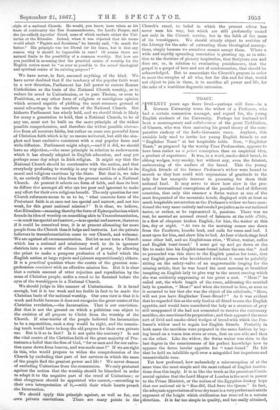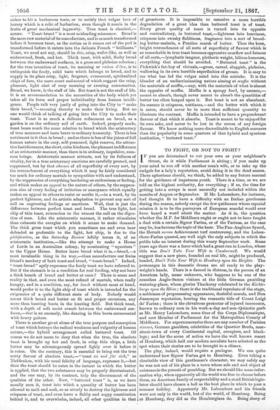TOAST.
TWENTY years ago there lived—perhaps still lives—in a German University town the widow of a Professor, who had a certain connection amongst, and regard for, the young English students of the University. Perhaps her husband had been a contemporary and collaborateur of the great Tiefdenken, of Giessen, who was then maturing his grand theory of the com- parative cookery of the Indo-Germanic races. Anyhow, this amiable lady used to invite her young English friends to eat "Englisher Toast" at her hospitable table. Now, "Englisher Toast," as prepared by the worthy Frau Professorinn, appears to have been rather an a priori conception than an empirical idea, a product of experience. It was, in a word, smoke-dried bread, in oblong wedges, very smoky, but without any, even the faintest, embrowning of the surface of the bread. This the young English friends of the former Professor's widow were bound to munch as they best could with expressions of gratitude to the lady for her energetic interest in procuring for them their national food. It may serve to show how slow is the pro- gress of international conceptions of the peculiar food of different countries, that only this summer a Swiss waiter at one of the most frequented of the mountain hotels, displayed with at least as much hospitable ostentation as the Professor's widow we have men- tioned the very same entirely unfounded prejudice as to our national tastes, or rather, as he represented it, passions. There was no rest, he assured an amused crowd of listeners at the table d'hdte, in a flow of eloquent broken English, for him, the waiter at this inn, day or night. " At two in the morning comes one down from the Faulhorn, knocks loud, and calls for room and bed. I must open for him, and show him to bed. At four o'clock rings loud some other bell, and an Englishman cries, Waiter, waiter, coffee and English toast-bread.' I must get up and go down at the fire to make him his English toast-bread before the sun rise." And so persuaded was this slave to the English passion for toast, that any English person who breakfasted without it must be painfully sitting on the safety-valve of an ungovernable longing for the missing article, that he was heard the next morning at breakfast tempting an English lady to give way to the secret craving which she was evidently suppressing at too great a cost. " Mees !" he called out, the whole length of the room, addressing the married lady in question, " Mees 1" and when she turned to him, as soon as it occurred to her that she was the object of his solicitude, "Mees, will not you have Englischer Toast-Bread ? " As it was evident that he regarded this as the only food at all fitted to sate the English appetite, and would have considered the lady as a creature of prey still unappeased if she had not consented to receive the customary sacrifice, she sanctionedits preparation ; and then appeared the same sort of livid and smoke-dried wedges of bread with which the Pro- fessor's widow used to regale her English friends. Probably in both cases the sacrifices were prepared in the same fashion by lay- ing bread on a warm iron stove or oven, first on one side and then on the other. Like the widow, the Swigs waiter was elate to the last degree in the consciousness of his perfect knowledge how to appease the fierce insular appetite for " toast-bread." He felt that be held an infallible spell over a misguided but imperious and uncontrollable race.
Yet how profound, how melancholy a misconception of at the same time the most simple and the most refined of English institu- tions does this imply. It is as like the truth as the prevalent Conti- nental opinion that the Lord Mayor of London is the next in power to the Prime Minister, or the notion of the Egyptian donkey boys that our national air is " Ros-Bif, God Save the Queen." In fact, the adequate appreciation of true dry toast is a veryperfeetandsubtle exponent of the height which civilization has reached in a certain direction. It is far too simple in quality, and too easily obtained, either to hit a barbarous taste, or to satisfy that vulgar love of luxury which is a relic of barbarism, even though it revels in the fruits of great mechanical ingenuity. True toast is classical,— severe. " Toast-bread" is a most misleading misnomer. Bread is the mere raw material of its manufacture, and is as much transformed before it becomes toast, as the cotton as it comes out of the pod is transformed before it enters into the delicate French " brilliants." Toast, we need not say, should be thin, crisp, wafer-like, as well as embrowned, fresh, and hot. Thick toast, with solid, fleshy bread between the embrowned surfaces, is a gross and plebeian solecism ; for the true intention of toast, its meaning or raison d'etre, is to extinguish the foody, solid taste which belongs to bread, and to supply in its place crisp, light, fragrant, evanescent, spiritualized chips of fare, the mere scent and sound of which suggest the crisp, pleasant, light chat of easy morning or evening conversation. Bread, we know, is the staff of life. But toast is not the staff of life. It is an accommodation to the necessities of the body which yet takes all its form and proper individuality from human intelli- gence. People talk very justly of going into the City to " make their bread,"—meaning thereby to make their living. But no one would think of talking of going into the City to make their toast. Toast is as much a delicate refinement on bread, as a garden is on the ordinary soil of earth. Indeed, properly made, toast bears much the same relation to bread which the aristocracy of true manners and taste bears to ordinary humanity. There is less nutriment in it than in bread ; and so there is less of the juices of full human nature in the easy, self-possessed, light reserve, the attrac- tive fastidiousness, the short, calm kindness, the pleasant indifference of an aristocratic manner, than there is in ordinary, impulsive, com- mon beings. Aristocratic manner attracts, not by its fullness of vitality, for in a true aristocracy emotions are carefully pruned, and suppressed, but by that absence of all superfluity of every sort, by the retrenchment of everything which it may be fairly considered too much for ordinary mortals to sympathize with and understand, by the suppression of everything bordering on enthusiasm or feeling, and which makes an appeal to the nature of others, by the suppres- sion also of every feeling of irritation or annoyance which equally makes an appeal to others to resist or soothe it,—in a word, by its perfect lightness, and its artistic adaptation to prevent any sort of call on engrossing feelings or emotions. Well, that is just the difference between perfect toast and bread. The true light, hot chip of thin toast, retrenches to the utmost the call on the diges- tion of man. Like the aristocratic manner, it rather stimulates than exhausts the energies on which it seems to make demand. The thick gross toast which you sometimes see and even hear defended as preferable to the light, hot chip, is due to the plebifwaticm, as the Saturday Review loftily terms it, of an aristocratic institution,—like the attempt to make a House of Lords in an Australian colony, by nominating " squatters " to the Upper House. Better leave bread what it is, —bread, —a most invaluable thing in its way,—than manufacture our Swiss friend's mockery of both toast and bread, " toast-bread." Indeed, " toast-bread " aptly expresses the food), toast we have referred to. But if the stomach is iu a condition for real feeding, why not have a thick hunch of bread and butter at once? There is sense and reality in that, and even the most refined of mortals, when really hungry, and in a condition, say, for lunch without meat at hand, would prefer it to the light chip of toast which is intended for the exigencies of a quite different state of body. Nobody would resent thick bread and butter on fit and proper occasions, any more than hunting boots in the hunting field. But thick toast, with a depth of soft moist crumb between the embrowned sur- faces,—that is an anomaly, like dancing in thin boots surmounted with heavy gaiters.
There is another great abuse of the true purpose and conception of toast which betrays the radical weakness and vulgarity of human nature,—the hybrid arrangement called buttered toast. Of course we do not mean to deny that when the true, the absolute toast is brought up hot and fresh, in crisp thin chips, a little butter may be advantageously spread lighly over it before it is eaten. On the contrary, this is essential to bring out the true nutty flavour of absolute toast,—" toast an and fur sich," as Tiefdenken, with his usual felicity of language, expresses it,—but then the toast should be eaten in the instant in which the butter is applied, that the two substances may be properly discriminated, and the one may, by its contrast, help the discernment of the qualities of the other. Now, "buttered toast" is, as we have usually seen it, toast into which a quantity of butter has been allowed to melt and soak, so as utterly to destroy the lightness and crispness of toast, and even leave a flabby and soppy constitution behind it, and to overwhelm, indeed, all other qualities in that of greasiness. It is impossible to conceive a more horrible degradation of a great idea than buttered toast is of toast. Every great quality of toast is turned into its opposite and contradictory, in buttered toast,—lightness into heaviness, crispness into awashy flabbiness, fragrance into a sort of brood- ing butter-malaria, a Pontine marsh of butter. Thus the keen, bright retrenchment of all sorts of superfluity of flavour which is so remarkable in true toast becomes oppressive overflow and fatness of all sorts,—lymphatic languor, plethoric weight, bilious humours, everything that should be avoided. "Buttered toast" is the Pickwick's fat-boy of victuals,—gross, carnal, sluggish, plebeian, wallowing in its own horrible superfluities of grease. It is easy to see what has led the vulgar mind into this mistake. It is the blunder of an undiscriminating nature aiming at nuyfin without the materials of muffin,—nay, with the materials of what is almost the opposite of muffin. Muffin is a spongy food, by essence,— meant to absorb, though never meant to absorb the quantities of butter too often heaped upon it. But toast is not an absorbent.. Its essence is crispness, nuttiness,—and the butter with which it is eaten, should never be in more than sufficient quantity to. illustrate the contrast. Muffin is intended to have a preponderant flavour of that which it absorbs. Toast is meant to be enjoyed for its own sake, and never to be lost in the excess of any foreign flavour. We know nothing more discreditable to English manners than the popularity in some quarters of that hybrid and spurious. institution, " buttered toast."































 Previous page
Previous page